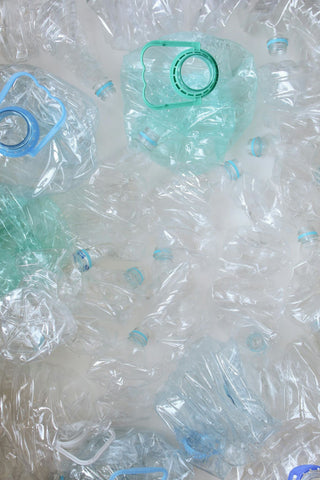Greenwashing is rife and, with more companies jumping on the "green" bandwagon claiming to offer all-natural products that are good for you and the environment, it can be hard to decipher between those brands that are truly committed to people and planet, and those that aren't.
Here we break down what greenwashing is and how you can avoid it so that you can make choices that fully align with your values, leaving you filled with joy and not dread.
What is greenwashing?
Greenwashing is a marketing tactic used by companies to make their products or services appear more environmentally friendly than they actually are. This can include companies making misleading or false environmental claims or obfuscating the truth about their supply chains.
How can I spot and avoid greenwashing?
It can be difficult to distinguish between genuine environmental practices and greenwashing. However, there are some steps you can take to avoid greenwashing and make more informed decisions - below are our top tips to help you navigate the shopping aisles with confidence.
1. Look for third-party certifications
One way to avoid greenwashing is to look for products that have been certified by reputable third-party organisations. These organisations independently verify environmental claims made by companies - and provide credibility, as opposed to own-brand logos of green leaves or cuddly bunnies.
At By Sarah, we are proud to be a certified B Corporation meeting the gold standard in sustainability, plus our products are registered with The Vegan Society and certified cruelty free with Cruelty Free international. We've gone the extra step to have our collection independently verified to give you extra comfort and reassurance.
2. Do your research
It can be more time consuming, but sometimes a little bit of homework helps to avoid greenwashing claims. Take a look on the website or social media pages of a company to see how they talk about their environmental practices and track record. You could even contact them directly with any questions you have.
You can read our latest B Corp Impact Report where we share the progress we've made over the last 12 months in our commitment to people and planet. You'll also find plenty of resources on our Journal where we delve deep into the science of our natural ingredients and sourcing. Take our UK-grown zero waste hemp seed oil used in our Ally Recovery Facial Oil where the seeds are saved from landfill and repurposed into the antioxidant-rich plant oil we use.
3. Consider the big picture
When evaluating the environmental impact of a product, consider the entire lifecycle of the product from production to disposal. A product that appears sustainable during use may have a significant environmental impact during production or disposal.
Across our skincare collection we use 30% PCR glass, "post-consumer recycled" content, meaning the glass is reclaimed from the end-user and then crushed, melted down and used again. There are some fantastic environmental benefits of using recycled glass which includes using less virgin materials, saving energy, lower CO2 emissions and supporting the circular economy as glass is infinitely recyclable and, with PCR glass, you really can "close the loop".
4. Look for transparency
Companies that are genuinely committed to sustainability will be transparent about their practices and policies. Look for information on their website and if there isn't much available, or you have the sense a company is not being transparent about their environmental practices, it could be a sign they are engaged in greenwashing.
We provide a full ingredient list across our website so you can see with total transparency exactly what is in each product (not all brands do this) - which is especially helpful if you have stressed, sensitive skin (which is why our collection is also Dermatologically Tested and suitable for sensitive skin). There's also an A-Z glossary of our ingredients so you can delve deeper into the natural plant actives we use, plus our sustainability guides to give you further detailed information on how we care for people and planet.
By following these top tips, you can avoid falling for greenwashing and make more informed decisions when it comes to choosing environmentally friendly products. A quick recap?
Here's the takeaway: Remember to look for third-party certifications, do your research, look for transparency, and support companies with a genuine commitment to sustainability. By doing so, you can make a positive impact on the environment and support companies that share your values. Now that is something to smile about.
--
Join our Newsletter to receive our latest news, arrivals and skincare tips straight to your inbox every week. All content © By Sarah. All rights reserved.



